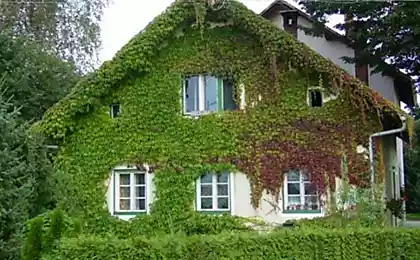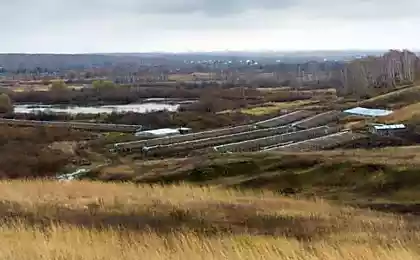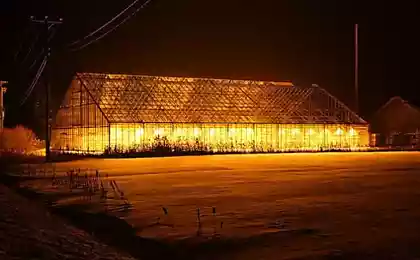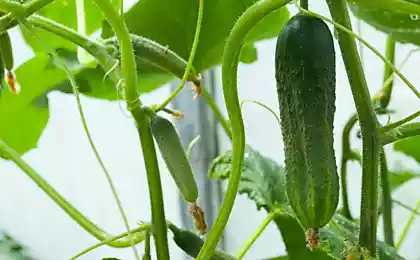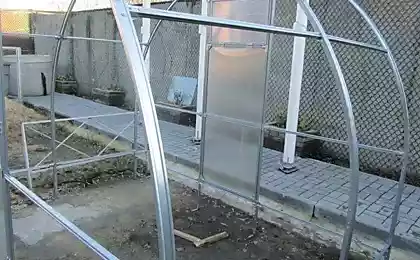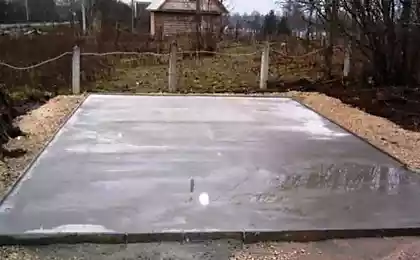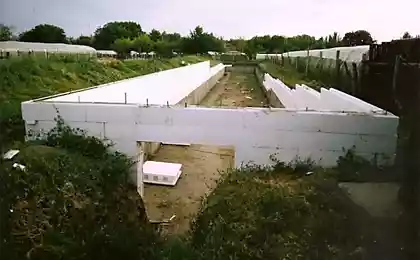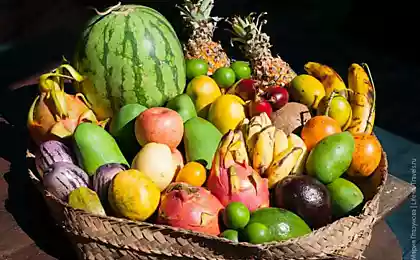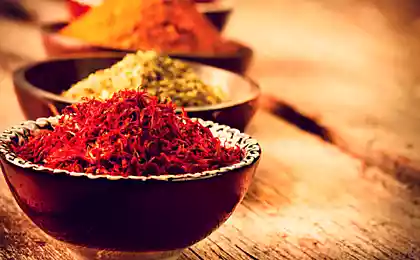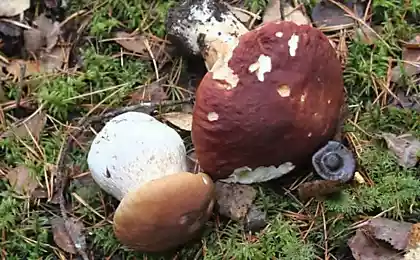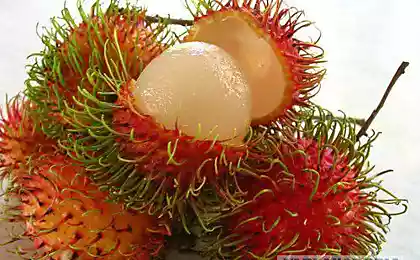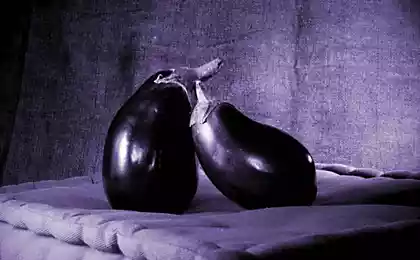548
How to grow sweet grapes of the South to the North without a greenhouse
For more than 20 years in my garden in the Novgorod region grows and ripens the grapes Augustine (sustainable). I consider it the most interesting for the North of black earth, and for other regions.
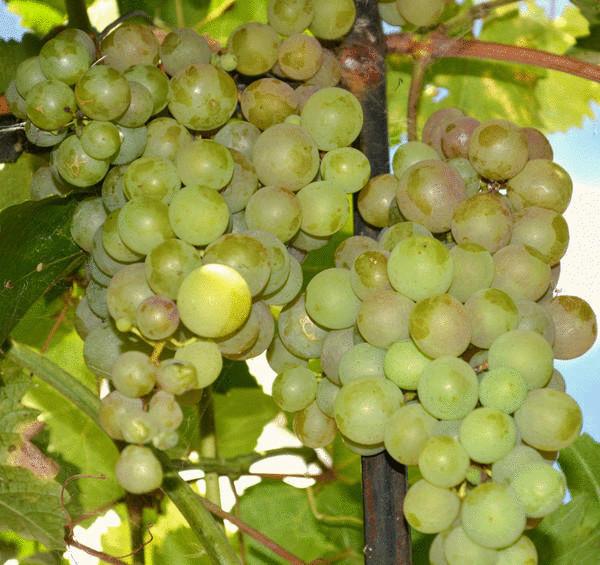
Grade — a dream destination for vacationers! Minimum effort — maximum profit. Does not hurt (I have for 20 years — not a single diseased leaf!), strong growth, rooting is excellent. Stepchildren are almost there, the frost resistance and winter hardiness is good. Bunch — the standard for food: 500-700 g Beauty! The taste is no different from the same, growing in its home country of Bulgaria. I grow it in the North without greenhouses.
On the grapes written many articles and books, but all they talk about farming practices in southern areas. Here grapes have been doing a lot of years. Literature on growing grapes in the South and faces the novice gardener.
For Siberia and the black earth of the literature on the grapes a little. The experience of successful growers who have achieved success in a difficult climate, is lost in the mass of advertising literature offering miracle innovations at commercial prices...
I do a garden for 40 years. Grapes — 30. Experienced the most major fashionable varieties recommended for the North, now left of them only some of the most unpretentious, hassle-free, which fully provide for my family in August–September dessert delicious berries. They grow from me without a greenhouse and without time-consuming farming.
Here Bulgarian sweet grade Rusbal, pitted the bunch is not placed on the palm:
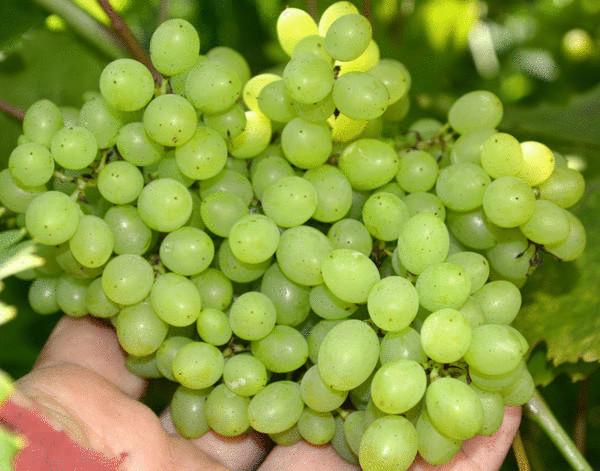
My garden is located in the East of the Novgorod region. To Vologda closer, than to Moscow. Summer is often damp, cool, with peaks in July heat to +35°. The endless winter with thaws, but there are frosts to -35° — once every 5 years. And grapes, planted on the South side of the house in two pieces (a little more than a dozen bushes), annually collect buckets, and it always ripens under the sun without shelter.
On the photo: middle of June, flowered grapes of Murom; in the background — sort Silga:
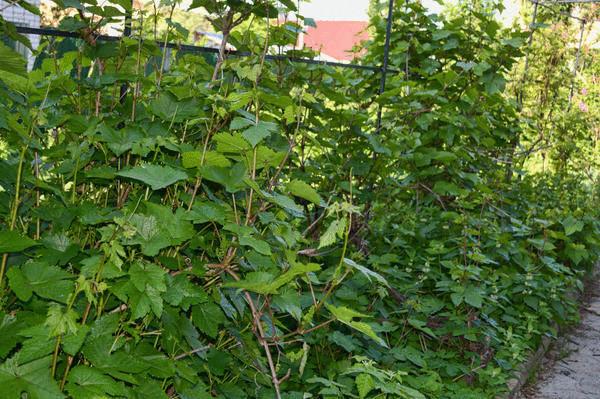
What we need sortav recent years, there are many varieties and hybrids of grapes very early and early maturing, derived from various research institutes in Bulgaria, Hungary, Moldova, Ukraine and Russia. A lot of new products offer breeders and lovers of our country.
With the advent of new winter-hardy, resistant and extra-early varieties Amateur viticulture made significant progress to the North. Interspecific hybrids of the third and fourth generations with high complex resistance have the excellent quality of the berries and with short pruning annually give high yields even in conditions of low average temperature (+15...+18°C) during 90-100 days of growing season. If desired, any gardener can buy such hybrids, and if you just take care of them, grapes will please its large sweet berries in the area, located up to the latitude of Vologda.
That's sort of Murom; ripens in early August:
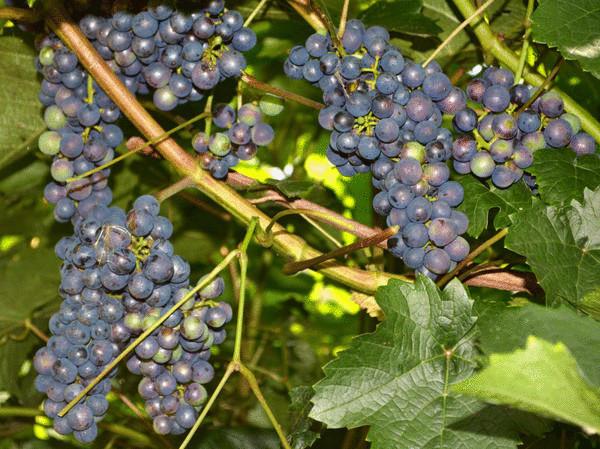
We are fundamentally different from southerners. In our Northern area of diseases and pests of grapes there, so there is no need to use pesticides.
An important factor is also the duration of sunshine, which is in the active phase of grape growing season in Novgorod is 2100 hours, while in the Kuban region — a total of 1625 hours (6 hours per day less). This figure, in the first place, affects the increase of sugar content and yield.
In our area the grapes are always winters under cover, so the problems with winter hardiness of the vines for us either. Our summer is short, so the main rule for us is to grow only early varieties, ripening even in the cold summer in August and early September.
That's the sort of Silta — sweet, with a hint of Izabela; ripens the end of August:
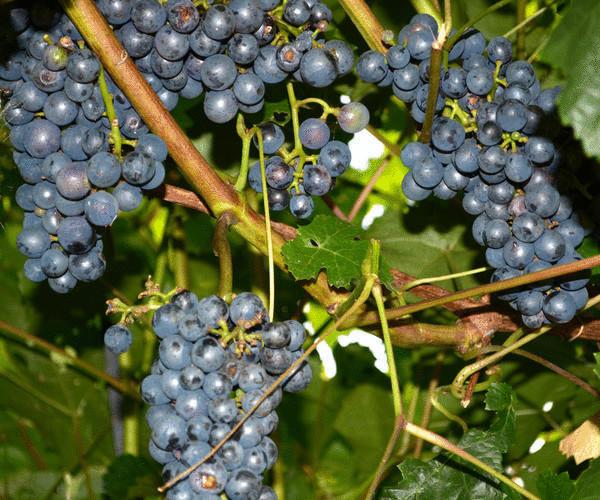
On the market of such varieties are now very much. But! Southerners by offering us their grades, forget: Mature sooner should not only a bunch of grapes, but the vine. Ask the seller for a sum of active temperatures is necessary for maturation of the vines we offer for sale a grade? Nobody never checked. For the South this problem is almost none.
By the beginning of September kept pace with the sweetest Augustine:
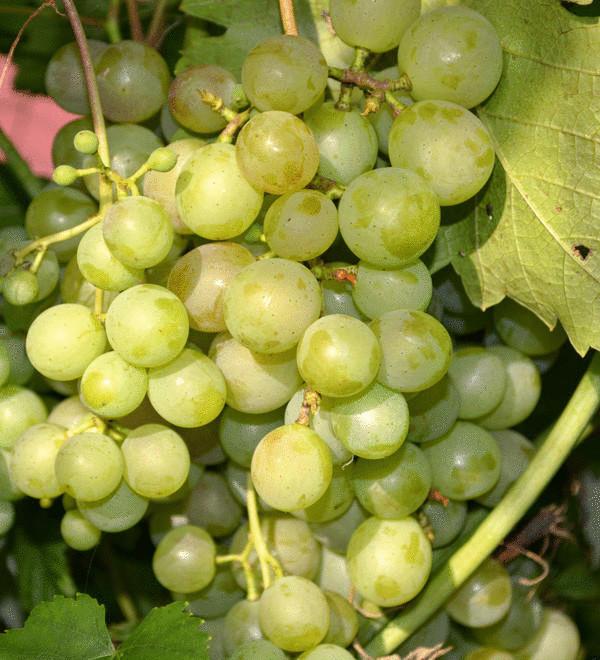
Examples
Most fans familiar with the variety of Arcadia (Institute of V. E. Tairova, Odessa). Early maturity — 115-120 days. That is, in our conditions a crop can Mature in the second half of August. For his aging sufficient sum of active temperatures 2300 degrees. And for a good maturation of the vines necessary sum of active temperatures of at least 2700°C. Such early varieties are dying in the winter, even in Samara. And never will grow without greenhouses in Novgorod.
Another example. Grapes Victoria (Vniive them. Y. I. Potapenko), СВ12-304 x European-Amur hybrid. Early maturity, vine ripen simultaneously with the ripening of the harvest (end of August). Problems with aging vines even in bad years I had.
All phases of growth and development of the Amur grapes begin and end earlier than in Europe. It is particularly important that the growth of the shoots stops at the end of July, the aging of the vines is completed by the end of August, the growing season ends before the onset of autumn cold.
Therefore, when choosing varieties , special attention should be paid to his ancestry and to give preference to those whose "blood" Amur grape.
After a lot of early varieties of new products, I had no problems with the following varieties:
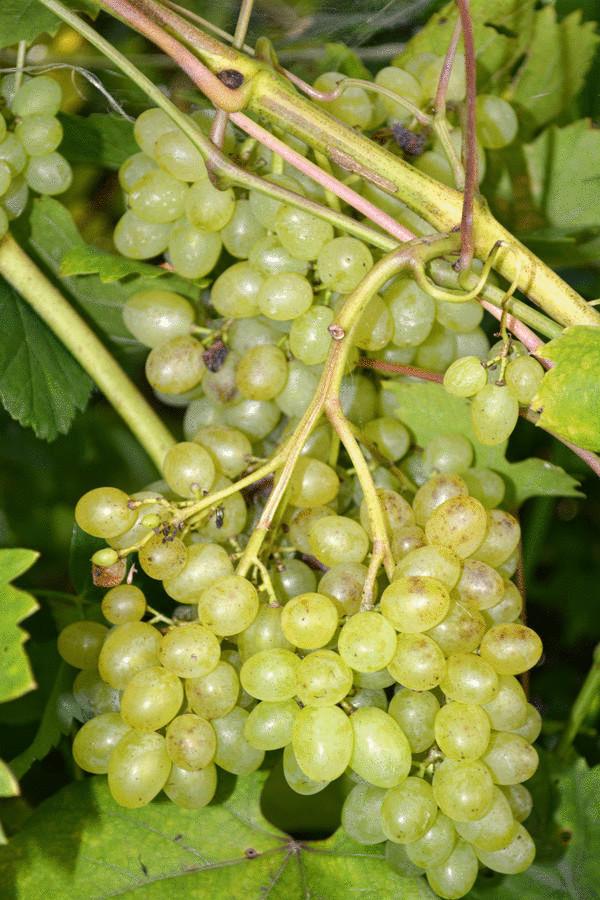
What we need soilEven southerners don't have problems with the heat deficit in the soil, so do not understand: for the cultivation of grapes in the earth (and in Siberia) the main task — increase of at least a few degrees soil temperature in the rooting zone.
The fact that the vegetation period in may and June the soil temperature in the rooting zone is much lower than the air temperature. The vine under such conditions grows rapidly, lengthened internodes, there is no formation of fruit buds, delayed maturation of the shoots, in spite of a sufficient air temperature. As a consequence, the vine does not ripen, and the long winter in hiding under a layer of snow vypivaet.
In the South the grapes are growing often poor in organic matter dense rocky soil. Roots there do not suffer from cold. This is not a problem.
Photo: June 17, 2015; the three-year variety Rusby gave a countless number of stems.
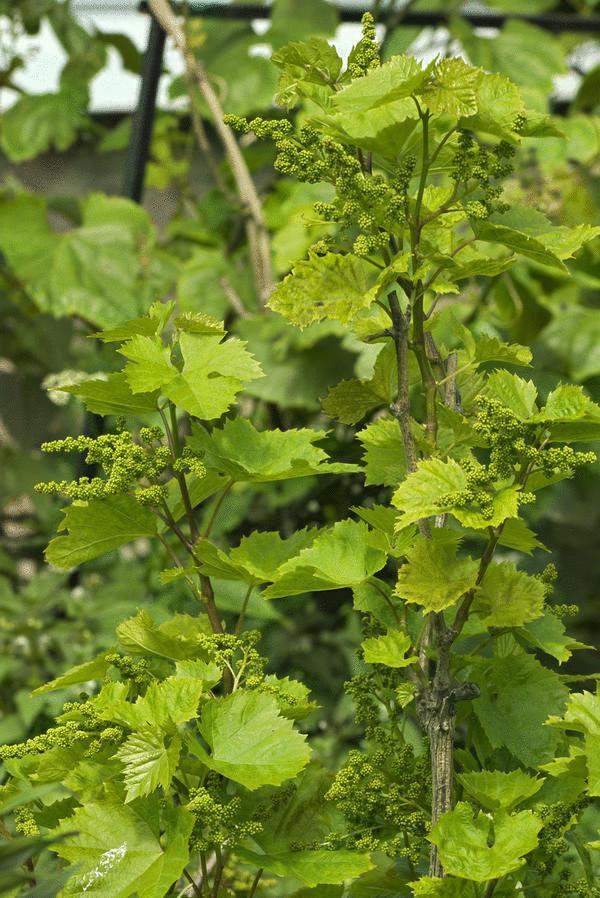
Therefore, all articles from experienced growers in the South recommend to northerners to care mostly about the temperature of the air to increase the amount of active temperatures for vines.
Let me remind you of the typical recommendations from the literature:
However, the"soil" recommendations very strange, speculative, with whom I fundamentally disagree, for example:
How do I use organicswhat is unique about my experience? That we all the years of keeping animals. We have a lot of organics, and I have learned to good use. Southerners against spreading under the vine and right. Excess nitrogen manure for grapes, especially for digging spoil the taste of the dessert varieties and will cause an outbreak of diseases.
For me, organic is not just manure or compost. I don't see it as "porridge" of available for plants nutrients.
It is important to understand that organic is and the energy of carbon for soil biota. If it is to make polupereprevshie, with a predominance of coarse fibers (straw, chips); to make only surface (as mulch) and regularly (from year to year), not more than half a bucket per square meter, it will form an effective chain of the microorganisms in stable ecosystems. Then the soil is always a very warm, airy, moist, fine-pored — that is, will be a Paradise for small suction roots of grapes.
Pits and trenches for the vines, I don't dig. On landing place, it is desirable to pour on top a small layer of humus (if the soil is quite nekulturny) and plant (better in spring) purchased a young seedling grapes.
The main thing — the first month is not fed, and watered. Mulch is any mulch. A month later, mulch is already decomposed manure, a little. On humus to put dry straw or dried grass, but a thin layer — no more than 5 cm It stimulates fungi and mycorrhiza in a natural way.
No need to rush things, it is not necessary to water the young seedling "organic solutions": we will isvalue and can delay the development of beneficial microorganisms.
However, I always use a watering stimulants rhizosphere. Any type Ribav or NV 10.
Power made compost for the first year is more than enough. The main thing is not to overdry roots. And that quinoa and nettles are not grown above the sapling and it is not drowned out.
Fall in two places, retreating from trunks 10-15 cm, I make holes with a depth of about 15-20 cm and make 1 tablespoon-lasting fertilizer (Buyskiy WMD).
Will be 5 years by worms and other soil engineers this organic evenly distributed to a depth of 30 cm deep, will create a warm porous the land of the living. You only need organics to make regularly! A bit! Superficial! Without digging!
Such an energy feeding in the soil will occur an unprecedented variety of life, any natural ecosystem is sustainable and comfortable for the roots.
Don't listen to anyone who says that the roots will not go deep into, and all will be under the surface mulch. On my grapes a thick root goes deep into more than a meter. It is needed in case of drought. And fibrous roots with mycorrhiza and rhizosphere by azotfiksatsii penetrate into warm organic mulch on the bottom. Vysokozolnye roots entwine pockets long-lasting organo-mineral fertilizers and sugars accumulate in the leaves and stocks in the wood. With such stocks, supply warehouses no natural disasters grapes are not terrible.
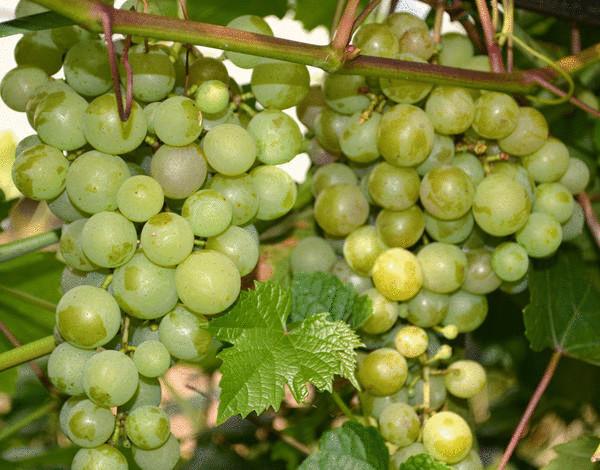
So, my secrets are simple:
P. S. And remember, only by changing their consumption — together we change the world! ©
Source: www.7dach.ru

Grade — a dream destination for vacationers! Minimum effort — maximum profit. Does not hurt (I have for 20 years — not a single diseased leaf!), strong growth, rooting is excellent. Stepchildren are almost there, the frost resistance and winter hardiness is good. Bunch — the standard for food: 500-700 g Beauty! The taste is no different from the same, growing in its home country of Bulgaria. I grow it in the North without greenhouses.
On the grapes written many articles and books, but all they talk about farming practices in southern areas. Here grapes have been doing a lot of years. Literature on growing grapes in the South and faces the novice gardener.
For Siberia and the black earth of the literature on the grapes a little. The experience of successful growers who have achieved success in a difficult climate, is lost in the mass of advertising literature offering miracle innovations at commercial prices...
I do a garden for 40 years. Grapes — 30. Experienced the most major fashionable varieties recommended for the North, now left of them only some of the most unpretentious, hassle-free, which fully provide for my family in August–September dessert delicious berries. They grow from me without a greenhouse and without time-consuming farming.
Here Bulgarian sweet grade Rusbal, pitted the bunch is not placed on the palm:

My garden is located in the East of the Novgorod region. To Vologda closer, than to Moscow. Summer is often damp, cool, with peaks in July heat to +35°. The endless winter with thaws, but there are frosts to -35° — once every 5 years. And grapes, planted on the South side of the house in two pieces (a little more than a dozen bushes), annually collect buckets, and it always ripens under the sun without shelter.
On the photo: middle of June, flowered grapes of Murom; in the background — sort Silga:

What we need sortav recent years, there are many varieties and hybrids of grapes very early and early maturing, derived from various research institutes in Bulgaria, Hungary, Moldova, Ukraine and Russia. A lot of new products offer breeders and lovers of our country.
With the advent of new winter-hardy, resistant and extra-early varieties Amateur viticulture made significant progress to the North. Interspecific hybrids of the third and fourth generations with high complex resistance have the excellent quality of the berries and with short pruning annually give high yields even in conditions of low average temperature (+15...+18°C) during 90-100 days of growing season. If desired, any gardener can buy such hybrids, and if you just take care of them, grapes will please its large sweet berries in the area, located up to the latitude of Vologda.
That's sort of Murom; ripens in early August:

We are fundamentally different from southerners. In our Northern area of diseases and pests of grapes there, so there is no need to use pesticides.
An important factor is also the duration of sunshine, which is in the active phase of grape growing season in Novgorod is 2100 hours, while in the Kuban region — a total of 1625 hours (6 hours per day less). This figure, in the first place, affects the increase of sugar content and yield.
In our area the grapes are always winters under cover, so the problems with winter hardiness of the vines for us either. Our summer is short, so the main rule for us is to grow only early varieties, ripening even in the cold summer in August and early September.
That's the sort of Silta — sweet, with a hint of Izabela; ripens the end of August:

On the market of such varieties are now very much. But! Southerners by offering us their grades, forget: Mature sooner should not only a bunch of grapes, but the vine. Ask the seller for a sum of active temperatures is necessary for maturation of the vines we offer for sale a grade? Nobody never checked. For the South this problem is almost none.
By the beginning of September kept pace with the sweetest Augustine:

Examples
Most fans familiar with the variety of Arcadia (Institute of V. E. Tairova, Odessa). Early maturity — 115-120 days. That is, in our conditions a crop can Mature in the second half of August. For his aging sufficient sum of active temperatures 2300 degrees. And for a good maturation of the vines necessary sum of active temperatures of at least 2700°C. Such early varieties are dying in the winter, even in Samara. And never will grow without greenhouses in Novgorod.
Another example. Grapes Victoria (Vniive them. Y. I. Potapenko), СВ12-304 x European-Amur hybrid. Early maturity, vine ripen simultaneously with the ripening of the harvest (end of August). Problems with aging vines even in bad years I had.
All phases of growth and development of the Amur grapes begin and end earlier than in Europe. It is particularly important that the growth of the shoots stops at the end of July, the aging of the vines is completed by the end of August, the growing season ends before the onset of autumn cold.
Therefore, when choosing varieties , special attention should be paid to his ancestry and to give preference to those whose "blood" Amur grape.
After a lot of early varieties of new products, I had no problems with the following varieties:
- Galbena know,
- Rusbal,
- Platovskiy,
- Taiga,
- Timur,
- Tukay
- Pleven sustainable.

What we need soilEven southerners don't have problems with the heat deficit in the soil, so do not understand: for the cultivation of grapes in the earth (and in Siberia) the main task — increase of at least a few degrees soil temperature in the rooting zone.
The fact that the vegetation period in may and June the soil temperature in the rooting zone is much lower than the air temperature. The vine under such conditions grows rapidly, lengthened internodes, there is no formation of fruit buds, delayed maturation of the shoots, in spite of a sufficient air temperature. As a consequence, the vine does not ripen, and the long winter in hiding under a layer of snow vypivaet.
In the South the grapes are growing often poor in organic matter dense rocky soil. Roots there do not suffer from cold. This is not a problem.
Photo: June 17, 2015; the three-year variety Rusby gave a countless number of stems.

Therefore, all articles from experienced growers in the South recommend to northerners to care mostly about the temperature of the air to increase the amount of active temperatures for vines.
Let me remind you of the typical recommendations from the literature:
- select a site with southern slope; and the garden — better on the South side of buildings;
- avoid sites with shallow groundwater and stagnation of the melt and rain water;
- to plant vines 1.5 m to ridge height of 30 cm, a width of 1 m;
- positioning of the ridge from West to East;
- the trellis over the furrows, consisting of four wires (at the height of 60 + 40 + 40 + 40 cm), placed with a slight slope to the South with a distance of 2.5 m between trellis;
- to eliminate the shading of the ridges;
- it is desirable to insulate the ridge of the nonwoven material.
However, the"soil" recommendations very strange, speculative, with whom I fundamentally disagree, for example:
- lay under the ridges at a depth of 60 cm insulation from the waste shavings, scraps of boards and logs, brushwood, straw and other similar materials;
- to compact the soil of the ridges, to eliminate loosening;
- regularly to remove (pull) weeds;
- for deep warming at a distance of 0.5 m from the Bush to the ridge, dig in the bottle neck-down, crown up towards the midday sun;
- to avoid surface watering. Watering is carried out with warm water in the drainage wells located between the bushes...
How do I use organicswhat is unique about my experience? That we all the years of keeping animals. We have a lot of organics, and I have learned to good use. Southerners against spreading under the vine and right. Excess nitrogen manure for grapes, especially for digging spoil the taste of the dessert varieties and will cause an outbreak of diseases.
For me, organic is not just manure or compost. I don't see it as "porridge" of available for plants nutrients.
It is important to understand that organic is and the energy of carbon for soil biota. If it is to make polupereprevshie, with a predominance of coarse fibers (straw, chips); to make only surface (as mulch) and regularly (from year to year), not more than half a bucket per square meter, it will form an effective chain of the microorganisms in stable ecosystems. Then the soil is always a very warm, airy, moist, fine-pored — that is, will be a Paradise for small suction roots of grapes.
Pits and trenches for the vines, I don't dig. On landing place, it is desirable to pour on top a small layer of humus (if the soil is quite nekulturny) and plant (better in spring) purchased a young seedling grapes.
The main thing — the first month is not fed, and watered. Mulch is any mulch. A month later, mulch is already decomposed manure, a little. On humus to put dry straw or dried grass, but a thin layer — no more than 5 cm It stimulates fungi and mycorrhiza in a natural way.
No need to rush things, it is not necessary to water the young seedling "organic solutions": we will isvalue and can delay the development of beneficial microorganisms.
However, I always use a watering stimulants rhizosphere. Any type Ribav or NV 10.
Power made compost for the first year is more than enough. The main thing is not to overdry roots. And that quinoa and nettles are not grown above the sapling and it is not drowned out.
Fall in two places, retreating from trunks 10-15 cm, I make holes with a depth of about 15-20 cm and make 1 tablespoon-lasting fertilizer (Buyskiy WMD).
Will be 5 years by worms and other soil engineers this organic evenly distributed to a depth of 30 cm deep, will create a warm porous the land of the living. You only need organics to make regularly! A bit! Superficial! Without digging!
Such an energy feeding in the soil will occur an unprecedented variety of life, any natural ecosystem is sustainable and comfortable for the roots.
Don't listen to anyone who says that the roots will not go deep into, and all will be under the surface mulch. On my grapes a thick root goes deep into more than a meter. It is needed in case of drought. And fibrous roots with mycorrhiza and rhizosphere by azotfiksatsii penetrate into warm organic mulch on the bottom. Vysokozolnye roots entwine pockets long-lasting organo-mineral fertilizers and sugars accumulate in the leaves and stocks in the wood. With such stocks, supply warehouses no natural disasters grapes are not terrible.

So, my secrets are simple:
- Buy only early varieties, certainly with early maturing vine.
- Take care of the sum of active air temperatures.
- To take care of the soil, to make it live air warm.
P. S. And remember, only by changing their consumption — together we change the world! ©
Source: www.7dach.ru
Intelligence theory: is it possible to measure mental ability
White coating on the tongue: causes and treatment
